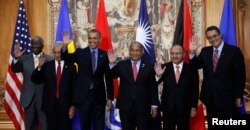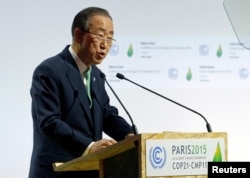U.S. President Barack Obama said in Paris on Tuesday that climate change is an “economic and security imperative” that must be tackled now. Back in Washington, however, the U.S. House passed two measures blocking his mandatory cuts in greenhouse gas emissions blamed for global warming.
One order cuts emissions from existing power plants and the other applies to future plants.
The Senate already passed similar measures and Obama is certain to veto.
Republicans say the president's executive order is too extreme, too expensive, and will cost American jobs. Democrats say global warming is a very real problem and a danger to the very existence of the planet.
In Paris, Obama spoke to reporters Tuesday on the sidelines of the U.N. Climate Summit, where leaders are working to agree on binding measures to keep global temperatures from rising more than two degrees C. above pre-Industrial Revolution levels.
“If we let the world keeping warming as fast as it is, and sea levels rising as fast as they are, and weather patterns keep shifting in more unexpected ways, then before long we are going to have to devote more, more and more of our economic and military resources not to growing opportunity for our people, but to adapting to the various consequences of a changing planet.”
The president called climate change a massive, generational problem that is “about the hardest thing for any political system to absorb” because its effects are gradual, diffuse, and often difficult to measure.
But Obama remained optimistic that climate change could be solved and that world leaders would reach a climate agreement with legally-binding emission targets at the end of two weeks of negotiations in Paris.
“I am convinced that we are going to get big things done here. Keep in mind that nobody expected that 180 countries would show up in Paris with serious climate targets in hand,” Obama said as he wrapped up his two-day trip and departed for Washington.
Pledges for help
Earlier Tuesday, the White House announced that 73 U.S. companies are pledging support for action on climate change. The goals call for the corporations to reduce emissions by as much as 50 percent, cut their water usage by 80 percent, and buy 100 percent renewable energy.
Also Tuesday, French President Francois Hollande announced France will give African countries $2.1 billion over the next four years to develop renewable energy sources and replace fossil fuels.
Obama met on the sidelines of the summit with leaders of five small Atlantic and Pacific Ocean island nations impacted by climate change, noting their vulnerability to rising seas.
"I'm an island boy," Obama said, referring to his childhood spent in Hawaii and Indonesia. "I understand both the beauty, but also the fragility."
The U.S. leader said the island nations may not be the most populous or strongest militarily, but have "a right to dignity and a sense of place." Obama said the Paris summit cannot simply "serve the interests of the most powerful" countries.
Several heads of government attending the U.N. climate summit Monday endorsed action to protect and restore forests.
Brazil and Norway declared they will extend their partnership to preserve Brazil's rain forests; and Britain, Germany, and Norway announced an aim to provide $1 billion per year for the next five years as incentive for countries to pursue emissions-reduction goals set out by the United Nations.
Colombia also announced that it will implement its plans for so-called "green growth" with the help of Britain, Germany, and Norway.
U.S. business titan Bill Gates, the founder of the Microsoft computer software firm, announced plans to team with 19 governments and 28 billionaires from 10 countries to create a multibillion-dollar public-private coalition to fund clean- and renewable-energy research.
The governments involved in the Gates effort have all pledged to double their spending on clean-energy research during the next five years.
Call for action
At the summit’s opening on Monday, U.N. Secretary-General Ban Ki-moon said leaders "have the power to secure the well-being of this and succeeding generations."
"You are here today to write the script for a new future, a future of hope and promise of increased prosperity, security and dignity for all," Ban said. "We need the world to know that we are headed to a low-emissions, climate resilient future and there is no going back."
This year, 183 countries have issued long-term plans to cope with climate change, but difficult negotiations are expected at the summit and related international meetings that run through December 11.
Before the conference opened, Obama met with Chinese President Xi Jinping and said the two countries have a common vision of what is needed in an agreement, including steps toward a low carbon global economy and helping financial support to help developing nations adapt.
The U.S. has pledged to cut emissions up to 28 percent by 2025, while China set targets to peak its emissions by about 2030.
Obama also held separate talks Monday on the “urgent threat” of climate change with India's Prime Minister Narendra Modi. The U.S. president highlighted India’s work on a solar alliance to deploy affordable clean energy to developing countries.
The United States, China and India account for about half of the world's emissions of carbon dioxide, a gas that traps heat in the atmosphere and that scientists have identified as a leading cause of the rising global temperatures.







